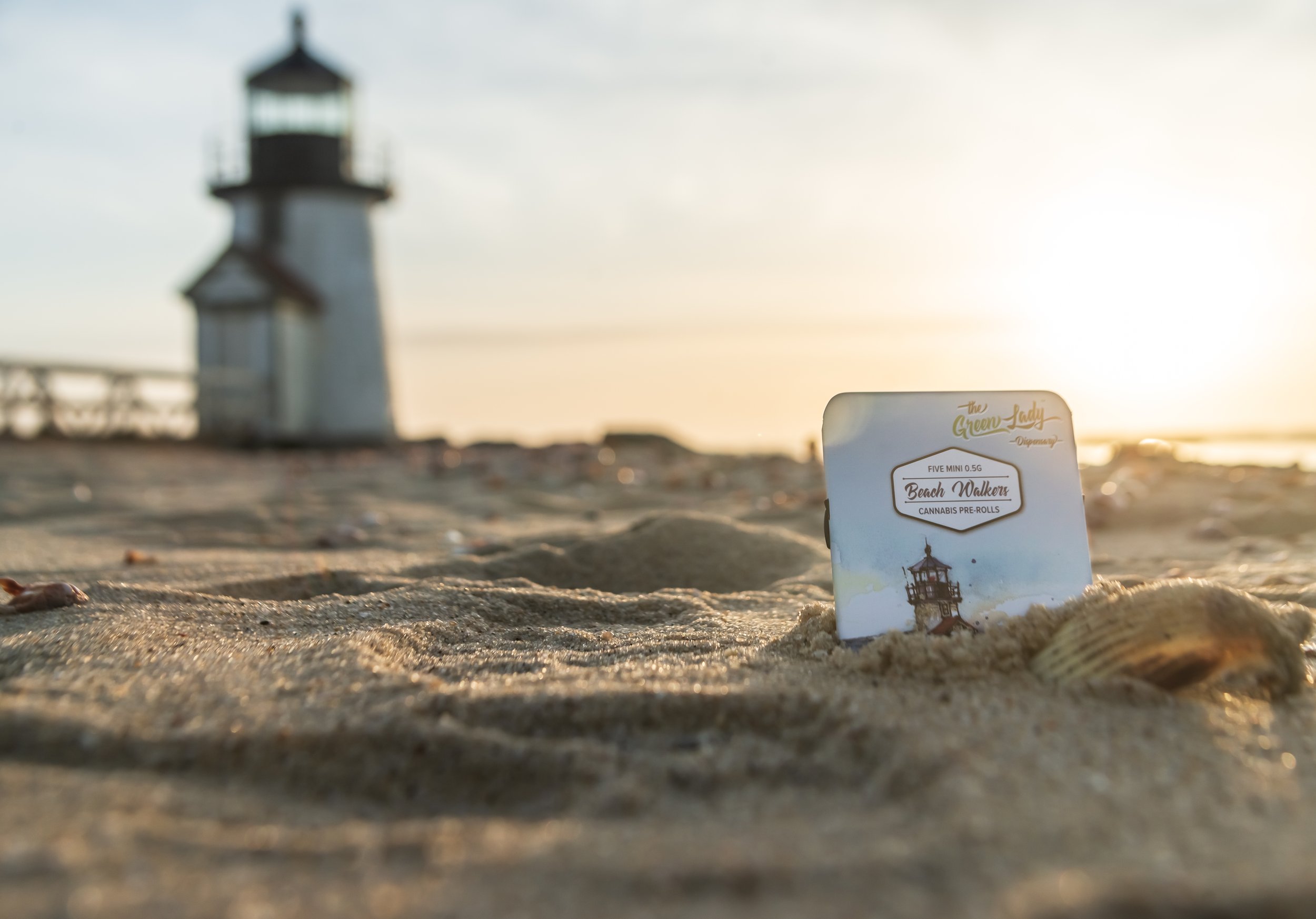
Commonly Asked Cannabis Questions
General FAQ’s…
-
The Green Lady Dispensary is a small business with two locations in the state of Massachusetts.
Our original store is located on Nantucket Island at 11 Amelia Dr.
Our newest storefront is located in Newton Centre at 740 Beacon St.
-
Anyone over the age of 21 who presents a valid government-issued identification may shop at either of our recreational stores. We recommend a driver’s license or passport.
To shop in Nantucket’s medical store, you must be a certified and registered medical cardholder in Massachusetts. Medical patients are required to bring their medical card and to bring valid government-issued identification to every visit.
-
Due to federal banking restrictions that limit legal dispensary operations in the United States, The Green Lady Dispensary can only accept cash and debit card sales at this time.
-
Due to our unique location on Nantucket and the current illegal status of cannabis on a federal level, The Green Lady Dispensary cannot buy or sell cannabis to or from the mainland as it would require crossing federal water and/or airspace. For this reason, the Green Lady grows, produces, and creates all our original cannabis products right here on Amelia Drive!
-
In alignment with our OG mission, the Green Lady Dispensary Newton presents the best hand-picked cultivars and cannabis infused products that Massachusetts has to offer. Sourced from small, local, minority, women, and family-owned businesses, you can expect to see some familiar products from our Nantucket store and much, much more!
-
Recreational customers may purchase 1 ounce of cannabis flower, or 5 grams of cannabis concentrate per daily transaction per person.
-
You do not need to be a Massachusetts resident to shop recreationally at any Green Lady Dispensary location.
-
The Green Lady Dispensary Nantucket is both a recreational and medical dispensary. To shop in the medical store, you must be a certified and registered medical cardholder in Massachusetts. Anyone over the age of 21 who presents a valid government-issued identification may shop in our recreational store.
The Green Lady Dispensary Newton is a recreational dispensary. Anyone over the age of 21 who presents valid government-issued identification may shop in our recreational store.
-
You cannot legally travel out of state with cannabis products purchased in Massachusetts.
Customers who shop at the Green Lady Newton should not travel across state lines with cannabis products.
At our Nantucket Island location, we are surrounded by federal water and airspace. You cannot travel off of the island with cannabis, as it is prohibited by federal law.

Commonly asked Cannabis Questions…
-
Cannabis is a mystic plant that has been used for a wide variety of purposes for thousands of years. The plant is native to Central and South Asia, and it is believed to have been first cultivated by humans for its tough fibers, which were used to make rope, clothing, and other items.
The use of cannabis for medicinal and recreational purposes also has a long history. In ancient China, for example, cannabis was used for a variety of purposes, including to treat pain, inflammation, and other ailments. The ancient Greeks and Romans also used cannabis for medicinal purposes, and the herb was widely used in the Middle East and India for both medicinal and recreational purposes.
Fast forwarding to the modern era, cannabis became widely known in the Western world during the 19th century, when it was introduced by Victorian-era doctors who were interested in its potential medicinal properties, for uses such as cough syrup prescribed by pharmacists. In the early 20th century, however, cannabis prohibition began with the 1937 Marijuana Tax Act, largely fueled by industrially driven political agendas and xenophobia, despite the opinions of medical professionals who believed that further investigation of cannabis may show substantial medical uses.
Today, the legal status of cannabis varies widely around the world. In some countries, it is legal for medicinal and recreational use, while in others it is strictly prohibited. The ongoing debate over the legal status of cannabis is driven by a variety of factors, in a large part still driven by historical stigma and racial bias.
-
While cannabis may be the perfect wellness tool for many, it is not for everyone. Every person has a unique endocannabinoid system that reacts differently to cannabis’ many naturally-occurring compounds. The only way to know how different types of cannabis could affect you is to try multiple different types of cannabis products in a responsible manner. This means reading the product label, talking to your budtender, doing your own research, and always following advice from your doctor or healthcare provider. Remember to start low and go slow; take small amounts and wait to experience the full effects before trying more (particularly with edibles, the effects of which may be delayed by up to two hours or more).
-
The endocannabinoid system (ECS) is a complex cell signaling system that exists naturally within the human body, regardless of whether one consumes cannabis or not. The ECS regulates many critical bodily functions, including learning and memory, emotional processing, sleep, temperature control, pain control, inflammatory and immune response, appetite, and so much more. Cannabinoids from the cannabis plant will bind to the various receptors found within the ECS. This process can increase or decrease certain activity associated with each receptor.
-
Cannabinoids are naturally occurring compounds found in the cannabis plant. There are hundreds of different cannabinoids and more being discovered each year as the limitations imposed by prohibition lessen. Most cannabinoids will not get you “high”. The main way in which the cannabinoids are typically differentiated is based on their degree of psychoactivity. Cannabinoids work by interacting with specific cannabinoid receptors present on the surface of cells in your endocannabinoid system.
-
Terpenes are aromatic oils that distinguish cannabis varieties with distinctive scents and flavors like citrus, berry, mint, and pine. Terpenes may play a key role in differentiating the effects of various cannabis strains – challenging conventional beliefs held about indica and sativa. Some terpenes might promote relaxation and stress-relief, while others potentially promote focus and energy.
-
THC (scientifically known as Delta-9 THC) is one of the more well-known cannabinoids within the cannabis plant and is responsible for causing consumers to feel “high”. Delta-9 THC may not be for everyone, as it can produce some side effects such as paranoia, red-eyes, and slowed reaction times. However, it can also produce positive effects such as giddiness, increased focus, pain relief, and relaxation. Research suggests that Delta-9 THC may be associated with a wide range of potential medical benefits.
-
CBD is the second most abundant cannabinoid and can be derived from Cannabis sativa L., Cannabis Indica and Cannabis ruderalis plants. Unlike its THC counterpart, it is federally legal and is reported to produce little to no psychoactive effects. However, many consumers report feeling an elevation in mood, reduced symptoms of anxiety, and efficacy with chronic pain management. Research suggests a wide range of potential medical benefits from CBD. However, with the surge of untested CBD products on the market nowadays, you should make sure you are purchasing your CBD from a reliable source, such as a dispensary or other authorized retailers.
-
CBN is another cannabinoid that is best known for its ability to support mind and body relaxation and promote sleep. Derived from aged cannabis, CBN shares some commonly reported effects of THC such as muscle relaxing, anti-inflammatory properties, and appetite stimulation. However, CBN is not known to produce strong psychoactive effects.
-
CBG originates from young cannabis plants. In its acidic form, it is sometimes known as the “mother of all cannabinoids” because all other cannabinoids are derived from it. Popularly consumed for its potential medicinal benefits, many consumers report CBG effective for pain management and inflammation, with no psychoactive effects. Some studies suggest that CBG may be possess antibacterial properties, neuroprotective qualities, and anti-cancer applications.
-
While THCV’s molecular structure is similar to Delta-9 THC, the effects are quite different. THCV has been reported by consumers to suppress appetite and produce energizing effects. In large doses, THCV can be psychoactive, but is typically not observed to be when taken in small doses.
Nantucket’s Medical Program FAQ’s…
-
To shop in Nantucket’s medical dispensary, you must be a certified and registered medical cardholder in Massachusetts. When visiting, you must always present your valid government-issued identification and MA medical card at the reception desk in order to shop medical.
Anyone over the age of 21 with valid government-issued identification may shop recreationally in Nantucket and Newton Centre.
-
Select certifying health care providers and nurse practitioners can certify qualifying individuals for their Massachusetts medical card. After certification, the patient will then need to register with the state of Massachusetts’ medical program. Certification and registration both must be renewed annually with your certifying health care provider and the state of MA. Please don’t hesitate to call us for further guidance!
-
Medical patients are not taxed in the state of Massachusetts (recreational shoppers are taxed 20% on cannabis). Medical cardholders are also eligible for a variety of deals, discounts, and loyalty points that are not available to recreational customers. Medical customers can also purchase higher-dosed edibles and tinctures than what is permitted for sale in recreational shops.
-
Massachusetts medical dispensaries are not able to process out-of-state medical cards and cannot accept them at this time.
-
Medical patients are allotted a 60-day supply through their medical provider, which can be used in full or in part over the course of 60 days. Typically, a 60-day supply is 10 ounces but may vary dependent on what each medical patient’s provider determines to be necessary on a case-by-case basis.
